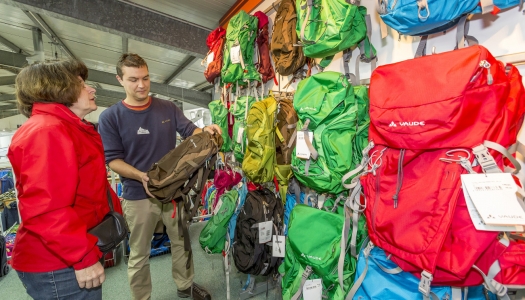
Sustainability dialog with a “sense of mission”
Constructive criticism is highly welcome
People’s ability to ask questions and complain directly to VAUDE – or indirectly to independent organizations – about the environmental impact of our products is important and valuable. VAUDE has not currently introduced any formal grievance mechanisms for environmental issues. We have, however, been able to address and resolve all questions or uncertainties that have reached us.
As a company, VAUDE has a responsibility for the conditions under which our products are manufactured, sold, used and disposed of. Direct feedback from stakeholders about our products and company headquarters helps us to understand where we have a need for action and potential for optimization.
Direct contact with suppliers and retailers
The supply chain of outdoor products is complex, international, widely branched and contains numerous potential ecological problem areas. Our direct business partners are the clothing manufacturers, (garment manufacturers, Level 1) who produce finished VAUDE products from selected materials.
We also receive feedback from our direct customers – the retail trade. This provides the basis for a lively exchange; feedback and criticism – regarding ecological aspects as well – comes directly to us.
Material suppliers also need to be involved
We have no direct (contractual) relationship with any other upstream and downstream stages of a product during its life cycle. These include, for example, the material manufacturers who supply our production facilities, and of course also the consumers who buy our products in stores.
Our products also have ecological effects on these stakeholders and we want to find out more about them. We rely on the people who find their way to VAUDE to provide us with feedback.
Minimizing environmental impacts with bluesign®
The production of materials in particular can have various serious environmental impacts in the supply chain (more on this at Materials). With the bluesign® system, we attain the highest level of security that the best available technologies are being used. We cannot control this 100 percent however.
Open dialogue with all interested parties
We at VAUDE maintain open dialogue with all interested parties. We want to be transparent and authentic, and we try to answer each and every question on ecological issues. Representing our claim of being Europe’s most sustainable outdoor brand to the outside is important to us as is answering questions with the correspondent expertise.
In addition, we have a "sense of mission" for sustainability. We want to reach as many people as possible with the issue, sensitize them and help them to make conscious and well-informed purchasing decisions. We are convinced that slowly but surely, the market for environmentally friendly products is growing, which is also important for us in economic terms.
Good contacts with experts, civil society and initiatives
Thus, in the last few years, we have built up a dense network of contacts with sustainability experts, non-governmental organizations (NGOs) and initiatives with which we interact closely. Overall, the dialogue with trade, consumers, civil society and other stakeholder groups in Germany and Europe works well, even without a formal grievance procedure.
This, however, does not protect us from occasionally being criticized in public, for example by Greenpeace as part of their Detox Campaign. While situations like this are not particularly pleasant, most NGOs do ultimately represent legitimate concerns. We try to initiate dialogue to explore together where VAUDE should start in order to achieve improvements.
Sales representatives advise retailers
Retailers have direct contact with their VAUDE in-house and field sales representatives. These employees have had extensive training on all sustainability issues and are available to offer customers advice and assistance.
This applies to the buyers in stores who should make purchasing decisions in favor of eco-friendly products. And it also relates to the sales staff in stores who want to provide professional advice to their end customers - and not just on issues of functionality and fit, but also on the environmental impacts of the products.

|
Good Advice
Specialized sales staff who have been extensively trained by VAUDE can advise their customers on the ecological effects of the products. |
E-Mail and telephone are public and available to all
Our customers may directly contact VAUDE customer service by e-mail or telephone. The telephone number is: + 49 (0) 7542 5306-0
If questions, ambiguities or complaints should arise here or in stores, which sales staff cannot answer, these are then passed on to the VAUDE CSR Team. A committee member with expertise on the issue checks the facts and either responds directly to the customer or provides the sales staff with the answer.
Improving communication in the supply chain
In the supply chain, we have thus far only installed systematic grievance mechanisms for social issues (more at VAUDE in the Supply Chain). Environmental issues can also be addressed through this channel; however, the awareness of employees in the supply chain for this issue has thus far not been very strong.
We have a need for action in this area. In the supply chain, raising awareness for environmental issues with both management and employees of each facility is a top priority. For us, it would be valuable and helpful to receive any complaints from the manufacturing companies that come directly from the local residents, employees of the companies or also NGOs.
In a pilot project, we are currently introducing an environmental management system for a selection of suppliers. In the course of this Environmental Stewardship Program , training is provided for suppliers on this issue.
Protecting those who detect grievances
Local cultural practices play a large role, such as the relationship between management and employees in production. Similarly, protection must be ensured for those who uncover and report abuses - for example, a complaints procedure that preserves the anonymity of the whistleblower such as what the "FairWear Foundation" (FWF) offers in the area of working conditions.
Even if we should obtain evidence that ecological aspects in our supply chain are not being sufficiently taken into account, our influence is often limited. Especially the farther upstream the stage is in our supply chain, for example such as for the suppliers of grommets or zippers for production at our partner facilities. Cooperation within the industry is therefore vital to increasing the leverage on suppliers. Mandatory (statutory) requirements as defined by the European Chemicals Regulation REACH , or voluntarily such as in the Textile Association, also help here.
| GRI: | G4-EN34 |
| GRI: | G4-DMA Environmental Grievance Mechanisms |






